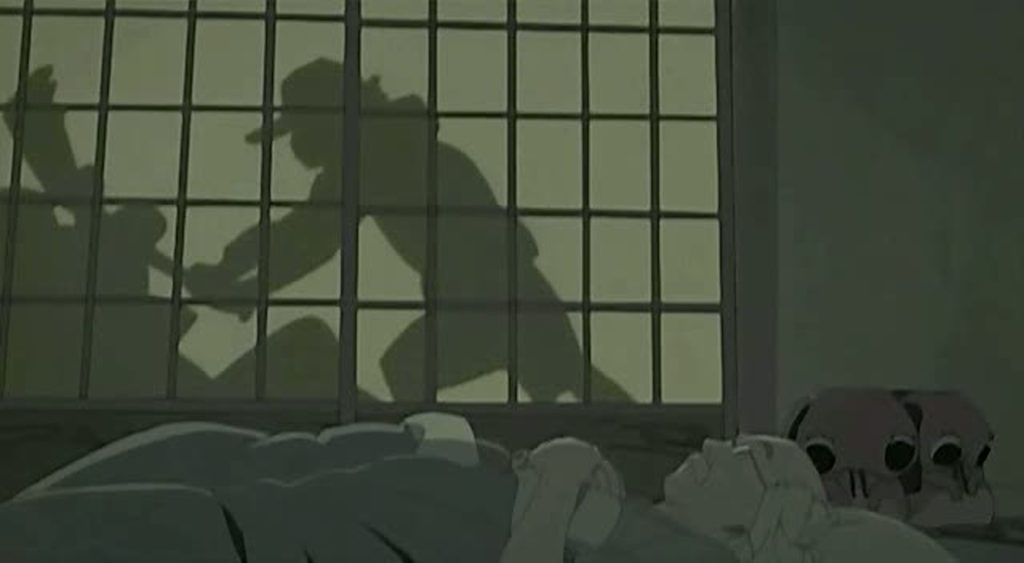The eighth episode of Paranoia Agent, “Happy Family Planning”, is weird. Weird in a way that beggars the very word “weird” – I don’t think English has a proper way to describe how massively peculiar, in a (of course) disturbing way, this story is, nor the way it is presented. However, Paranoia Agent has consistently thrived on breaking rules and bending expectations, by which count “Happy Family Planning” is simply par for the course.
Still: “par for the course” doesn’t feel exactly right, not for a story about an internet suicide cult and their wacky misadventures in trying to kill themselves, replete with “wokka-wokka” music cues. Structured as a slapstick-heavy farce, “Happy Family Planning” is in every important structural way a comedy, except for the categorically important fact that it is not in the remotest degree “funny”.
Indeed, it opens with a series of abstract shots of a person walking across the street that’s rather more unnerving than anything else, especially because the man walking is wearing a Maromi backpack, whose dead-eyed gaze (his googly eyes shift about as the man moves) is one of the most unlikable expressions that this wholly creepy character has worn yet. In case I haven’t mentioned, Maromi gives me the goddamn willies.
There are hints here and there as to why they’ve been driven to this extreme. Fuyubachi is suffering from a disease of some manner or another, and it appears to be the kind that you don’t get better from; Zebra, as we learn from a brief cutaway shot late in the episode, is suffering from a very particular sort of lost love that is often associated with suicide amongst the morally conservative. Kamome, it’s impossible to make out: a bubbly little thing who is all smiles and laughter, she’s hardly wracked with the kinds of depression and hopelessness we usually associate with the suicidal – and yet, of the three, she’s the one who is most urgent about it, eager to die with that all-encompassing eagerness found only in the Japanese schoolgirl. If this were a polemic about the rise of internet suicide pacts (a bizarre cultural phenomenon found elsewhere in the world, but reaching the levels of “a definite problem” in Japan, if not probably “an epidemic”), I’d say that Kamome is the sort of guileless innocent who thinks that anything on the web is totes awesome, sucked into a vortex of self-destruction because she doesn’t know better.
For “Happy Family Planning” could be nothing more than another entry in the Paranoia Agent Depression Olympics – following “Fear of a Direct Hit”, with its pedophilia, and “MHz”, with its overall sense of moral rot, and its skin-tingling sound design, it wouldn’t have been unexpected for an episode about a suicide pact to be the darkest one yet. And while it’s massively disturbing, it’s not “dark”.
The trick about the episode is that it forces us to agree with the three suicideketeers without our even realising we have a choice. For the basic mode of the episode is the farcical error: throughout the whole piece, as Fuyubachi, Zebra, and Kamome fail to jump in front of a train, or to hang themselves, or to suffocate on exhaust, it’s always presented with the same tone of “woops! haha, oh they’re so silly”, and while I’m hard-pressed to imagine anyone in the audience actually laughing as hard as the show seems to expect that we are, this is the very point: it is presented from the emotional perspective of someone like one of the protagonists, who is so detached from life that suicide, like anything else worth doing, is just plain funny when you do it wrong. The episode itself thinks so little of life that it doesn’t understand why, for example, it’s not funny to use clowning-around music to accompany an image like this:
Oh, and the ending. I won’t give away the ending, except to say: Fuck me. We figure it out before the characters do, but still, it’s eerie (and probably explains in part why the episode seems to devalue life so much).
“Happy Family Planning” takes place almost entirely outside the Paranoia Agent plotline: the three central characters used to chat online with someone who was almost certainly the now-deceased Kozuka Makoto, under the name “Fox”, and at one point they see Lil’ Slugger – who is, it would seem the Kozuka-Slugger, not the “actual” slugger – pursuing him in the joyful hope that he’ll club them all to death (and of course that creepy fucker Maromi is all over the place). It does nothing that we can see right now to advance the plot of the series – but it is an exemplary entry in the series anyway, for its massive dysfunctional view of the world is the sort of story that might be told by someone living within the Paranoia Agent universe. That is to say, it is a story told from “inside” that universe, rather than “about” that universe, and it confirms the obvious: inside the Paranoia Agent is a powerfully uncomfortable place to be.
